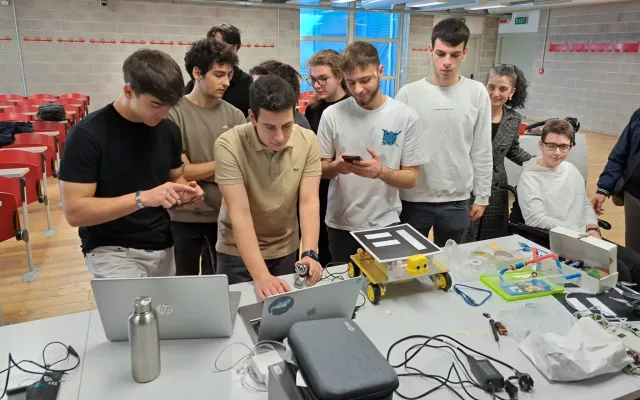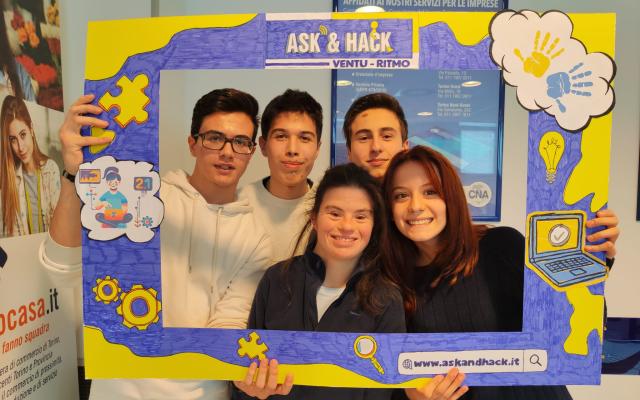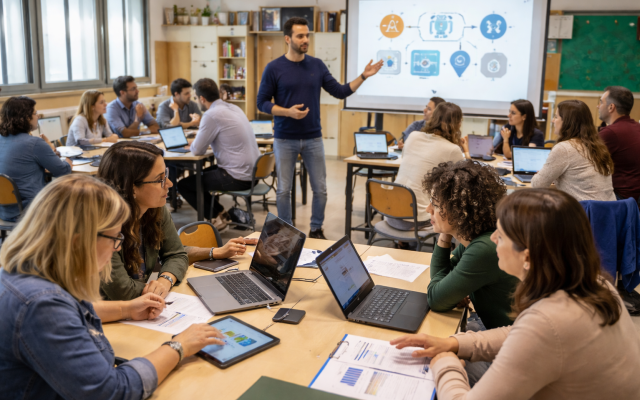8 min.
What follows is the full address presented by Alfonso Molina, Professor of Technology Strategy at the University of Edinburgh and Scientific Director of the Fondazione Mondo Digitale, at the Inauguration of the Officina held today.
Honourable Mayor, Minister Giannini, Minister Poletti, President Zingaretti,
Carlo D’Asaro Biondo
And all the authorities and individuals present here today
We are extremely pleased to have you here today at the Fondazione Mondo Digitale to inaugurate the New Jobs Workshop which has been made possible thanks to a generous contribution by Google. This will further enrich our educational and social innovation track for the working world and for all those who face this period of great challenges. We are proud to underline that this initiative starts in a Roman suburb, the Quadraro, a neighbourhood with a long history of strife, and whose young men and women can today fight to create a satisfactory life and work story.
I would like to briefly address the basis on which this project with Google was conceived. Last March, the Fondazione Mondo Digitale launched the first Phyrtual Innovation Gym in Italy, an innovative laboratory that we will inject into schools. We called it Phyrtual (physical + virtual) to emphasise the strategic integration between the virtual and physical dimensions in learning and innovation processes. The Phyrtual Innovation Gym is the place where to find a life education that is necessary in today’s complex world. The Phyrtual Innovation Gym addresses innovation at 360 degrees - technologically, socially and civically – to produce experiential education. We like to use the metaphor of a traveller. We are all 21st century travellers, especially our young men and women, as this is their century. As adults, we have already completed an important part of our trip during the last century. Now, our responsibility is to do our best so that young men and women may have a successful experience in the decades to come.
From a professional point of view, young men and women frequently have to change not only workplace but also their activity. While this may seem to generate fragmentary experiences that are still viewed negatively, this is an integral part of what has been identified as the boundary-less career phenomenon or a protean career[1] in which individuals manage themselves, facing changes with initiative and creativity as a new challenge. In the first place, these careers are not negative because they are part of our world and as Weick pointed out nearly 20 years ago in 1996: “… interrupted careers can be opportunities. When individuals give a meaning to these interruptions and use them as opportunities for improvisation and learning, they become adaptational challenges.” In 1994, Bateson emphasised how “curricula full of changes reveal resilience and creativity; the strength to welcome new learning.”
Education is certainly at the heart of this ability for resilience and creativity. And this is why the FMD, has developed the Life Education Model, which incorporates three types of contents: standardized knowledge that is systematically provided by educational system; life skills such as problem-solving, creativity and group work; and character values for responsible citizenship that includes solidarity, integrity and reliability. All of these contents have been recognised to be fundamental to face a world in which science and technology progress very rapidly and have a significant impact on the world of work, education and basically on all spheres of society.
If we add the current crisis that we are experiencing to this complexity, it’s not hard to understand that the our young men and women require not only better knowledge, but also a richer dynamism in learning. Our Life Education Model addresses this in three contexts: learning throughout one’s life, learning in all aspects of life and transformative learning, which has a profound impact on individual lives. There are international experiences that aim to implement an educational approach in this direction such as the Studio Schools or those of the Royal Society for the Encouragement of the Arts, Manufactures and Commerce in England, the Social and Emotional Learning Programme of the Singapore Ministry of Education or the Life-wide Learning Programme of the Hong Kong Government’s Education Bureau.
The Phyrtual Innovation Gym was conceived as the Italian contribution to these new types of education and we are proud that this concept has inspired the consultation on new laboratories and Phyrtual Innovation Gyms that the Italian Ministry of Education, University and Research carried out a few months ago and included in its “La Buona Scuola” Document. Today, I have the pleasure of announcing that the FMD has created an international network of 95 schools throughout Italy that want to develop a Phyrtual Innovation Gym in line with their competences, vision and passions. And we are also interacting with a range of local realities to stimulate and support the creation of local gyms.
The “Officina” New Jobs Workshop that we present today with Google significantly enriches the Phyrtual Innovation Gym. There are three new areas for emerging professions and the future of youth: a Video Lab with 3D animation and visual effects tracks, a Game Lab dedicated to professions related to the design and development of interactive games and an Immersive Lab dedicated to immersive virtual reality. These laboratories are integrated by areas and tracks dedicated to self-awareness, problem solving, creativity, team building, leadership, educational robotics, digital manufacturing (fab lab) and Lego Serious Play.
Above all, however, this project with Google allows us to accentuate the FMD’s fundamental mission, which is to work for an inclusive knowledge society. In fact, the “Officina” addresses prioritarily all those young men and women who are not working (ca. 42% of youth under the age of 29 according to the most recent data provided by Istat) and to the so-called NEET category (over 3 million individuals under the age of 34).
We have embraced this challenge with all our heart and have equipped these new spaces with the technology and content necessary to create a significant and entertaining experience for those young men and women who have decided to come to us in Quadraro. We have, for example, chosen stereoscopic screens for the Game Lab and equipped the Immersive Lab with a CAVE Automatic Virtual Environment, a reduced cost one compared to those present on the market, but efficient none the less. This innovation makes us one of the first Italian realities to provide a CAVE-type immersive reality educational experience and we are enthusiastic that it was inspired by the youth who will be the first to use it.
However, we are not alone. This opportunity that was presented to us by a Google Project allowed us to implement a solidary work model, to mobilise the best energies of a myriad organisations, not only in the city, to provide an experience that rewards the commitment that our youth is making to create a boundary-less and full-life career.
Based on our objectives and resources, we have decided to provide every young man and woman with a week at our Gym, 22 hours of organised activities. It may not be a very advanced training, but it will surely provide a significant orientation experience. They will work on developing greater self-awareness of today’s challenges and opportunities, learn about new professions related to technological development and, in particular, to 3D animation and visual effects, videogames, immersive reality and digital manufacturing (fab lab).
We have developed two tracks. One is called “All4All” in which participants begin on day one with interactive self-awareness exercises and over the next four days visit one new technological lab every day. The “One4One” track, on the other hand, after the day one interactive self-awareness exercises, involves participants in a four-day programme in a single lab. On Monday, we kicked off the “All4All” track.
Both of these tracks require teachers and tutors with a significant baggage of knowledge and competences. This is why we have decided to cooperate with other important local organisations, creating knowledge and learning alliances to provide an innovative and solidary answer with the available funds. I am please to tell announce to you all of the representatives of the organisations, who are working with the FMD on the New Jobs Workshop:
- Maria Grazia Berlangieri, Sapienza University Research Doctor in Digital Technology
- Giordano Bruno, Director, Istituto superiore delle Industrie artistiche (ISIA)
- Sandrine Cardinale, Steelcase
- Stefano Cassio, President, Associazione per il Disegno industriale del Lazio (ADI Lazio)
- Erino Colombi, President, Confederazione nazionale dell’artigianato di Roma (CNA Roma)
- Luca De Dominicis, CEO, Accademia italiana videogiochi (AIV)
- Fabio Mongelli, Director, Rome University of Fine Arts (RUFA)
- Nicola Sganga, President, Animatika
- Antonio Venece, Director, Istituto Europeo di Design di Roma (IED Roma)
The configuration of this alliance represents a systemic approach towards mobilising all the available local energy and competences to provide an efficient and long-term response to the needs of young men and women as travellers towards their life and professional future. The programme that we are developing is naturally destined towards the world of school and other developing local gyms that will welcome youth and other local actors to stimulate an experiential dynamic orientation towards life and work, contrasting phenomena such as school dropouts and the low participation rate of women in scientific and technological careers.
Thank You.
Alfonso Molina
Professor of Technology Strategy, University of Edinburgh and Scientific Director, Fondazione Mondo Digitale
[1]The Metaphor refers to Proteus, the Greek Sea God who can embody different forms.



